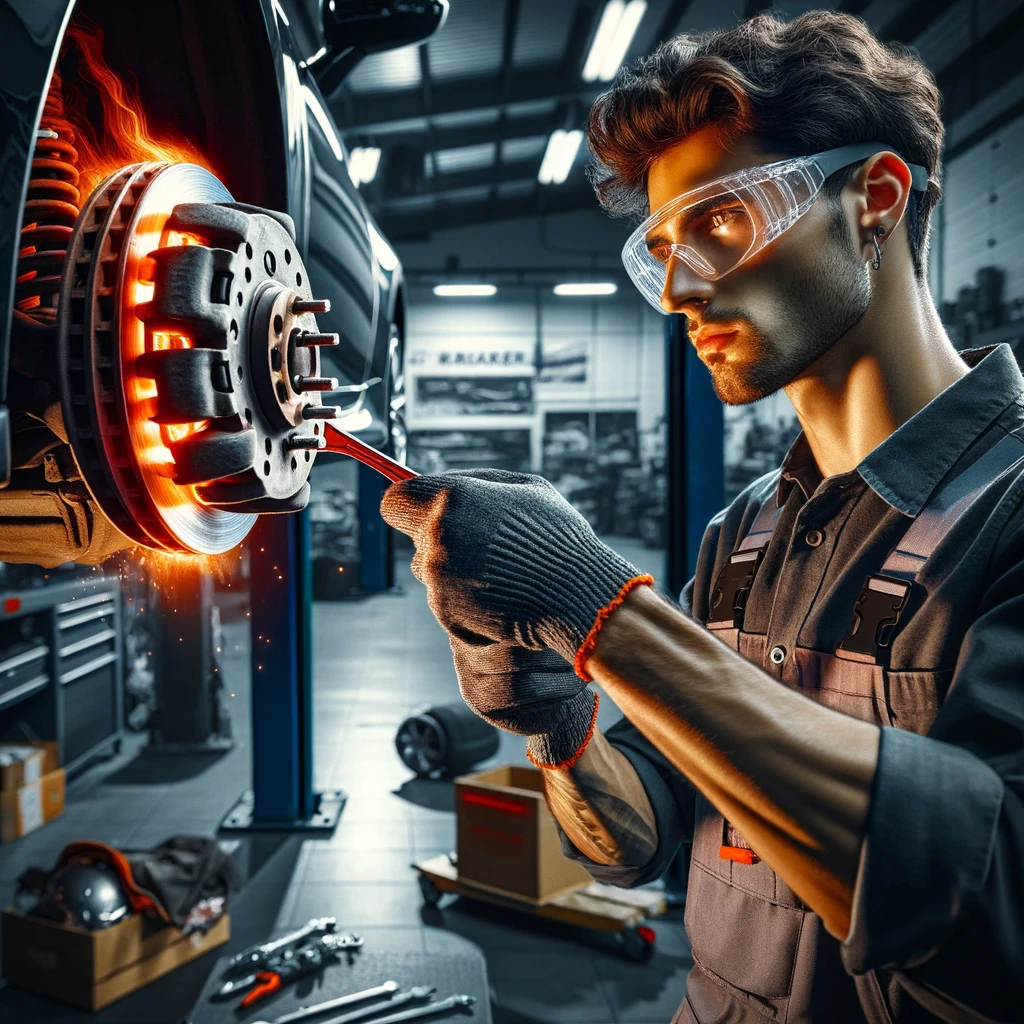How Hot Do Brake Calipers Get? Factors and Risks
When it comes to vehicle maintenance, the operating temperatures of components are crucial. Since we focus more on the brake side of things on our blog, a pertinent question is: How Hot Do Brake Calipers Get?
This article aims to discuss the factors affecting brake caliper temperature, its significance for safety and performance, and the implications for the durability of your braking system.
[ez-toc]
How Hot Do Brake Calipers Get?
Typically, during normal driving brake calipers can reach a temperature of between 120°C to 180°C. However, in more demanding situations like heavy loads or aggressive driving, brake caliper temperatures can peak up to 400°C. For extreme conditions, such as racing, they can soar up to 600°C.
Brake Caliper Temperature during Normal Driving
In everyday driving scenarios, including city and highway driving with moderate braking, calipers typically stay within a safe temperature range of 120°C to 180°C. This is considered normal and shouldn’t cause concern.
Brake Caliper Temperature during Heavy Loads and Aggressive Driving
When you’re driving in a more demanding way, like towing heavy loads, driving in hilly areas, or engaging in aggressive braking, the temperature of the brake calipers can rise significantly, sometimes reaching as high as 400°C. This increase is due to the extra friction and pressure on the brakes.
Brake Caliper Temperature during Extreme Conditions Like Racing
In racing or track days, brake calipers are pushed to their limits, often reaching temperatures up to 600°C. This is expected due to the high-speed braking and intense driving conditions associated with these activities.
Factors Affecting Brake Caliper Temperature
Different vehicles and braking systems might experience different temperature ranges. For example, sports cars designed for high performance may have calipers that handle higher temperatures better than a regular family car.
It’s interesting to note that the heat isn’t distributed evenly across the caliper. Areas closest to the brake pads tend to be hotter.
While these high temperatures are normal in certain situations, it’s important to remember that sustained excessive heat can damage the brake calipers. Components like seals and pistons can deteriorate, and brake fluid can be compromised, leading to reduced braking performance.

Is It Normal for Brake Calipers to Get Hot During Braking?
Yes, it’s completely normal and necessary for brake calipers to get hot during braking. This heat is a result of the energy transformation that occurs when the car’s motion is converted into thermal energy.
When you apply the brakes, the calipers press the brake pads against the rotors. This action creates friction, which in turn generates heat. The kinetic energy (motion) of your car is thus transformed into thermal energy (heat).
A well-designed brake system is crucial for efficient heat dissipation. The rotors, fins on the calipers, and air circulation around the wheels all play a role in this process.
Normal Temperature Range: Under regular driving conditions with moderate braking, brake calipers typically reach temperatures of 120°C to 180°C. This level of heat is expected and is not harmful to the brake system.
Excessive Heat: However, excessive heat, if sustained, can be a cause for concern. It can lead to wear and tear of brake components and affect the overall performance of the braking system.
Be vigilant for any signs of overheating, such as burning smells, unusual noises, or a reduction in braking performance. These could indicate that the calipers are getting too hot.
What Are the Dangers of Excessive Brake Caliper Heat?
Excessive heat in brake calipers can lead to several dangerous outcomes, affecting both vehicle performance and safety.
Reduced Braking Performance
When brake calipers overheat, the brake fluid can boil, causing a spongy pedal feel and less effective braking. This makes it harder to stop your car, increasing the risk of accidents.
Fading and Total Brake Loss
In severe cases, the boiling fluid can lead to vapor lock, resulting in complete brake failure. This is extremely dangerous and can result in serious accidents.
Damage to Brake Components
High temperatures cause rapid wear and tear on brake parts like seals and pistons. Overheated seals may crack and leak, while pistons can seize, leading to uneven brake pad wear and other issues.
Fire Risk
In extreme situations, overheated brakes can ignite flammable materials near the braking system, posing a severe fire hazard, especially in older vehicles.
Increased Maintenance Costs
Regular overheating can lead to more frequent and costly repairs or replacements of brake components.
Shortened Component Lifespan
Excessive heat accelerates the deterioration of all brake parts, leading to a need for more frequent replacements.
Lower Resale Value
Vehicles with a history of brake overheating issues might be valued lower due to potential future problems.
How to Prevent Brake Calipers From Getting Hot?
Avoid Aggressive Driving: Harsh braking generates excessive heat. Smooth, controlled driving helps maintain brake health.
Maintain Brake Fluid: Ensuring the brake fluid is at the correct level is crucial for preventing overheating.
Regular Brake Inspections: Having your brakes checked by a professional regularly can help catch and prevent overheating issues.
High-Quality Brake Pads: Invest in durable brake pads that can withstand and dissipate heat effectively.
Brake System Upgrades: For certain driving styles or vehicles, upgrading to a brake system with better heat management may be necessary.
More Brake Caliper Articles
- How Long Do Brake Calipers Last?
- Do Brake Calipers Come Under Warranty?
- How to Clean Brake Calipers Without Removing Them?
One Comment
Comments are closed.